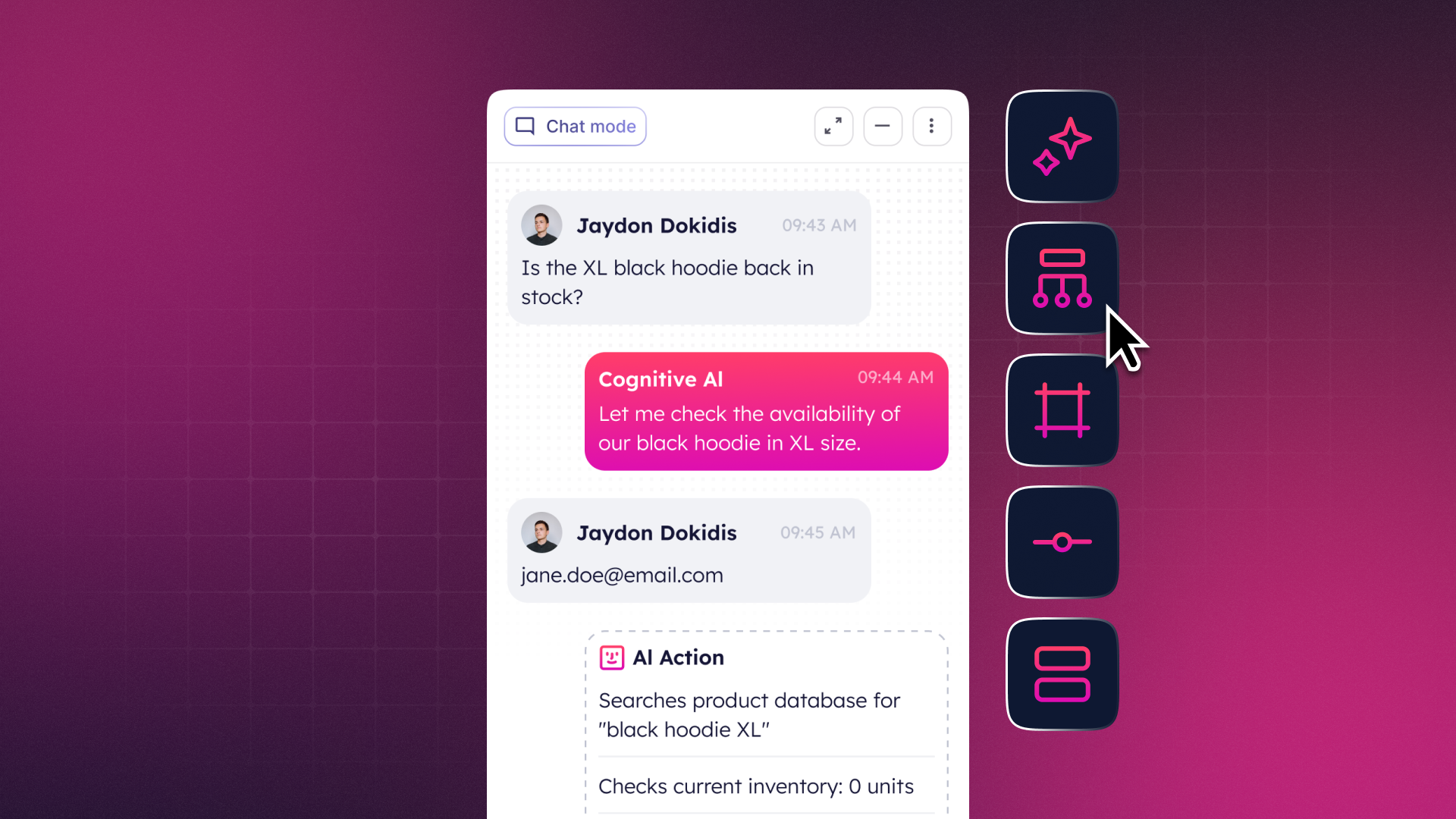
The clock strikes midnight, and your online store stays open, but your customer service team doesn’t. A shopper hesitates at checkout, unsure about sizing. Another needs help tracking their order. By morning, you’ll find abandoned carts and frustrated messages – missed opportunities that could have been captured with a simple conversation.
This is the reality for eCommerce businesses today. Customers expect an instant, personalized experience and product recommendations at every touchpoint, but scaling human teams to meet these demands is costly and inefficient. The gap between what shoppers want and what businesses can realistically deliver keeps growing wider – until conversational AI bridges it.
This is where conversational AI changes the equation. Unlike static FAQ pages or delayed email responses, these solutions (AI chatbots, virtual assistants, and voice-enabled tools) create dynamic, two-way conversations. And to make the shopping journey even smoother, they anticipate needs and deliver relevant responses.
Demand for these tools is exploding because they work. Now, the question is – what’s the right conversational AI chatbot solution for eCommerce businesses? The right platform can mean the difference between a clunky, frustrating bot and a seamless extension of your brand. Below, we explore the tools that empower businesses to build AI experiences that improve customer satisfaction and their shopping experience.
Why Conversational AI is a Necessity for Modern eCommerce
Customers don’t just buy products, but rather experiences. They expect stores to know what they want, answer questions instantly, and make shopping effortless. When businesses can’t deliver this, shoppers leave and rarely come back. Various solutions to these issues promise to improve customer engagement and keep online shoppers hanging out on your site longer; however, online retailers are turning to conversational AI to handle customer support, improve customer interactions, and supplement their human agents’ efforts.
The difference between thriving and just surviving increasingly comes down to one question: How well does your store communicate with customers?
The numbers tell the story:
- Online stores using AI conversations see over a 25% boost in customer satisfaction, revenue, or cost reduction
- 67% of customers across the world use chatbots for customer service
- Automation through artificial intelligence saves companies around $8 billion annually by eliminating the need for large support teams
It’s clear that the brands that adopt AI-driven conversations outperform those relying solely on human support and static shopping experiences. But what is it that conversational AI for eCommerce can do that makes it so transformative? Let’s explore.
24/7 automated shopping assistant for a better customer experience
Chatbots never sleep, never take breaks, and handle repetitive tasks instantly. They free up your team to focus on complex issues while ensuring customers always get immediate help. They can quickly answer customer queries about product availability, shipping information, simple FAQs, and more.
- Instant answers: Automatically respond to common questions about shipping, returns, and product details
- Order updates: Track packages, process cancellations, and notify customers about delays
- Cost savings: Reduce customer service costs by handling up to 80% of routine inquiries
Tailored product recommendations
AI remembers what your customers like and makes smart suggestions like your best sales associate would. It can quickly source customer data, analyze past customer conversations and online shopping habits, and make suggestions, improving the overall shopping experience.
- Smart suggestions: “You might also like…” recommendations based on browsing history
- Perfect timing: Special offers when customers hesitate at checkout
- Memory across visits: Remembers size preferences, favorite brands, and past purchases
Smarter business decisions from every chat
Every customer conversation becomes data to help you improve your store. Besides giving quick answers and smart suggestions, large language models display continuous improvement and learn from customer information, customer preferences, and customer needs; they analyze this data and deliver valuable insights that’ll help you exceed customer expectations.
- Spot trends: See what questions customers keep asking
- Boost conversions: Identify which product pages need better descriptions
- Get smarter: The AI learns and improves from every interaction
Inspiration: Industry leaders who already benefit from conversational AI for eCommerce
The proof of conversational AI’s power isn’t in the technology; it’s in the results achieved by household-name brands that have transformed their customer experience. These industry leaders demonstrate what’s possible when you combine AI with a smart eCommerce strategy.
Sephora set a new standard for beauty retail when it introduced its chatbot assistant. By analyzing customer preferences and purchase history, the AI provides personalized makeup recommendations that feel like advice from a friend. This approach drove an impressive 11% increase in bookings for their in-store makeup services, proving that digital conversations can actually boost physical store visits.
H&M took personalization even further with its AI stylist. Rather than just suggesting products, the chatbot engages customers in a conversational style, asking about preferences and occasions before recommending complete outfits. This thoughtful approach resulted in 70% higher engagement rates, showing that customers respond when retailers take the time to understand their unique tastes.
These success stories share a common thread: the winning brands reimagined the customer experience around conversational commerce. The results speak for themselves in higher engagement, increased sales, and more loyal customers.
Top 10 Tools to Build eCommerce AI Chatbots
Now that you know what eCommerce AI chatbots can do for your business and overall customer experience, it’s time to explore the tools you need to build your chatbot and achieve a competitive edge.
1. CogniAgent (Our top recommendation)
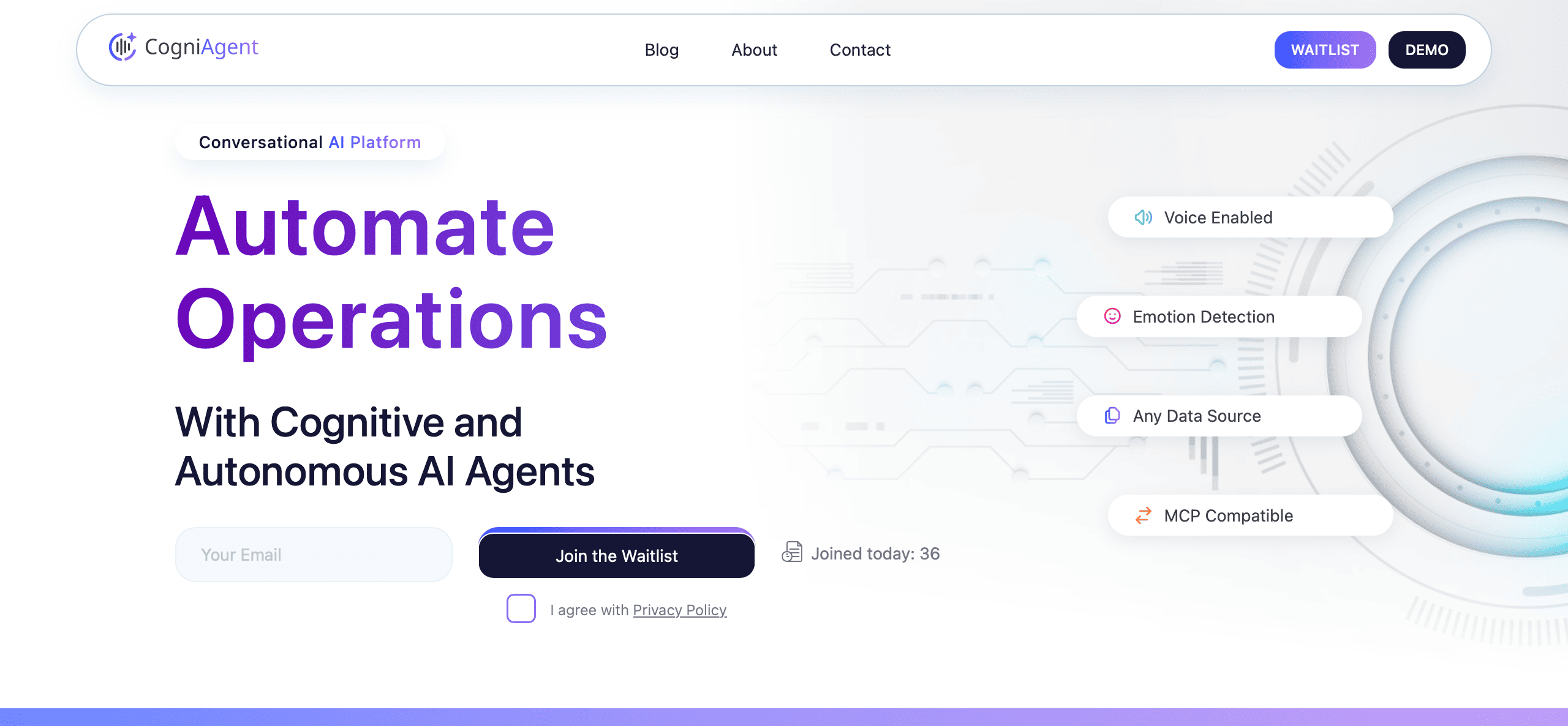
Overview: The most advanced no-code conversational AI platform built specifically for eCommerce, combining emotional intelligence with powerful automation.
Why it stands out:
- Truly autonomous AI agents that handle complex workflows
- Opportunity to create the network of autonomous AI agents
- Real-time voice sentiment analysis adapts to customer emotions
- Processes any data source (PDFs, videos, databases) automatically
- 5-minute deployment with no technical setup
Key features:
- Shopify/WooCommerce/Magento integrations (+2000 others)
- “Magic Window” visual coordination with voice interactions
- Multi-department automation (sales, support, operations)
- Transparent pricing at $0.15 per minute
Best for: Businesses wanting human-like AI conversations without coding
2. Drift
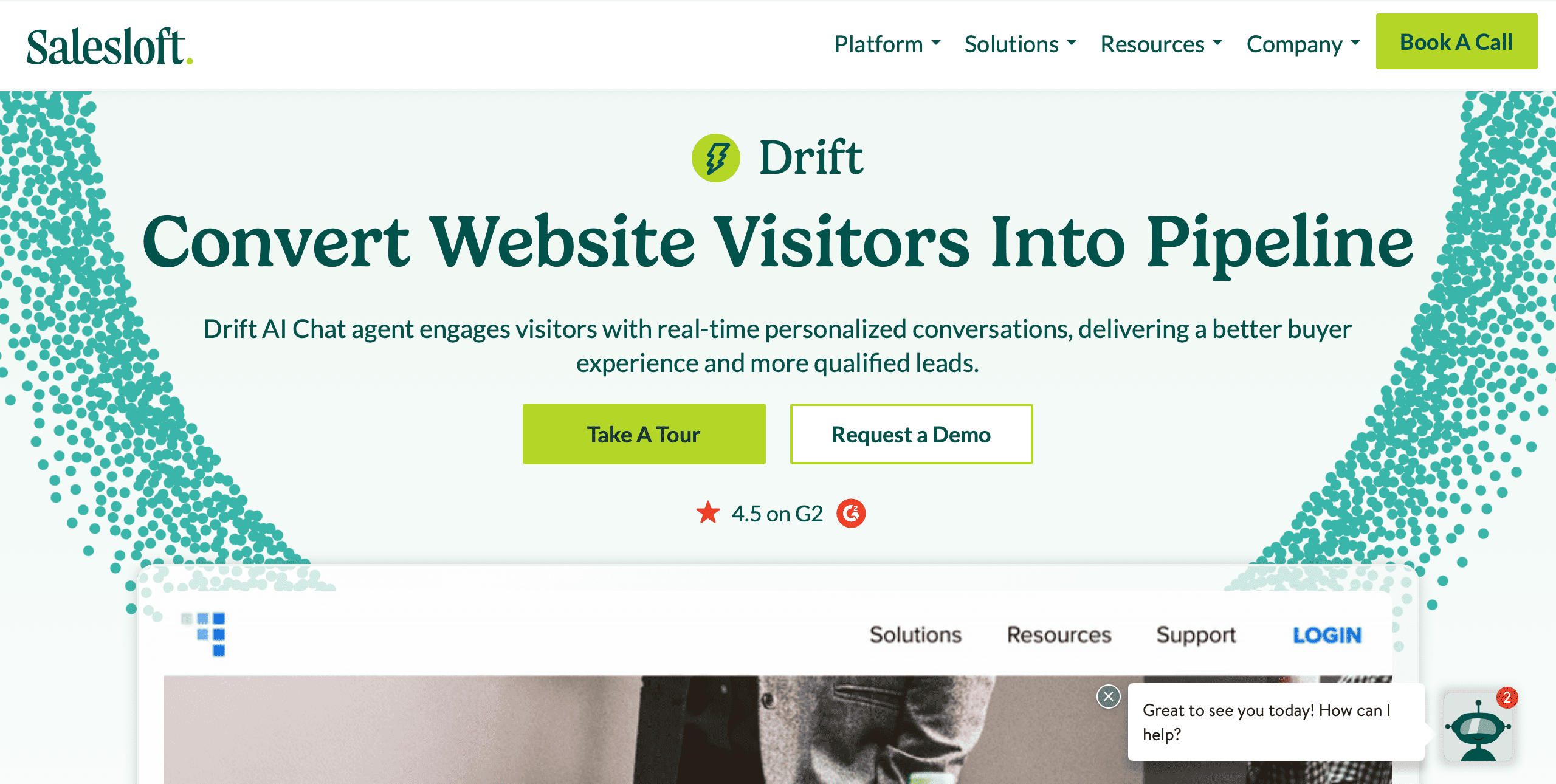
Overview: Drift is a conversational marketing platform designed to streamline lead generation and qualification through real-time engagement. It enables businesses to have meaningful conversations with website visitors, guiding them toward conversion faster.
Key Differentiators:
- Specializes in converting anonymous website traffic into qualified sales leads
- Powerful meeting scheduling tools that integrate directly into calendars
- Seamless handoffs between bots and sales reps for warm leads
Limitations:
- Primarily geared toward pre-sale interactions, with less focus on post-sale engagement
- Not tailored for eCommerce platforms or transactional workflows
Key Features:
- AI-powered chatbot for lead scoring and routing
- Deep integrations with CRMs like Salesforce and HubSpot
- Live chat with meeting booking functionality
3. Intercom
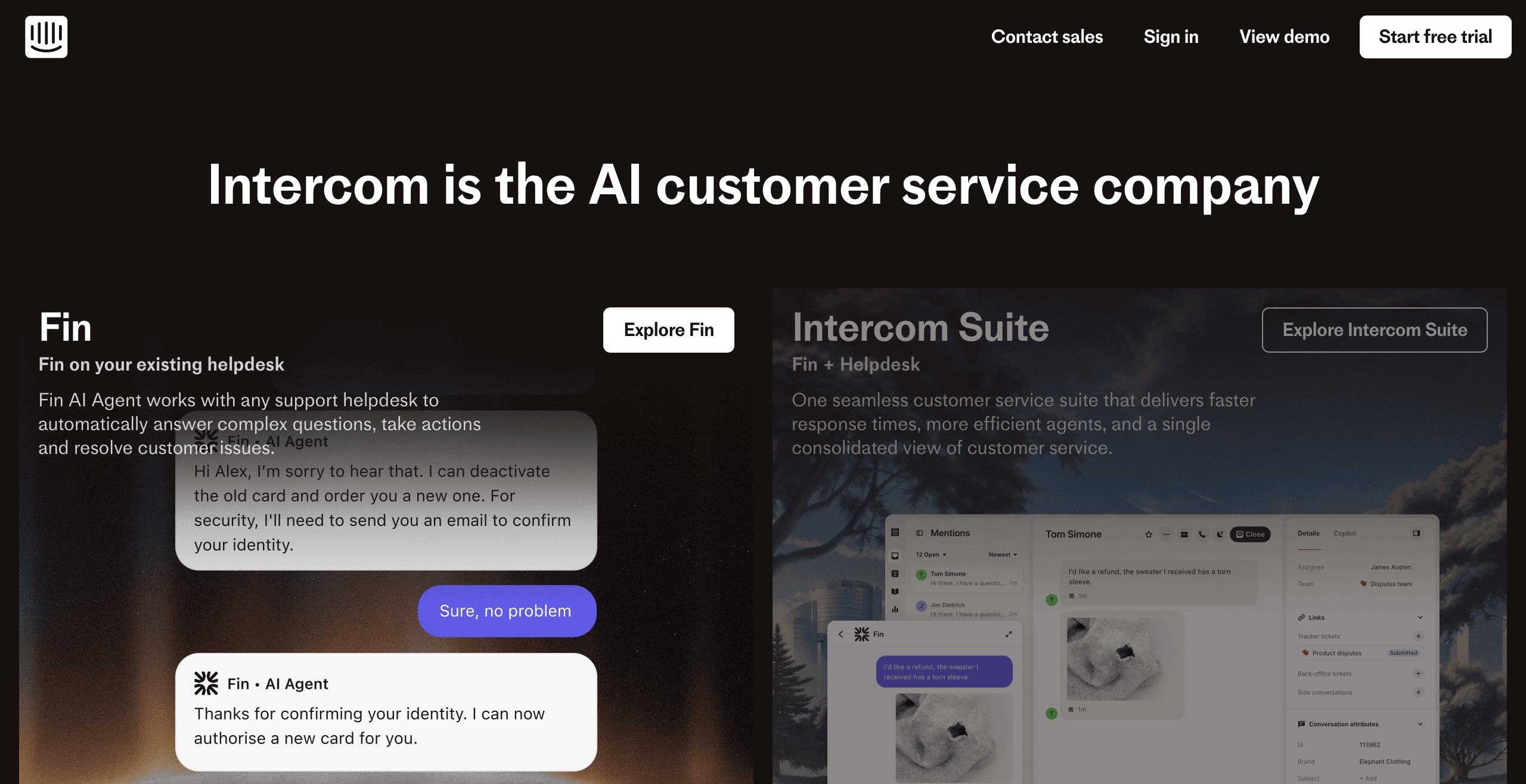
Overview: Intercom is a robust customer messaging platform that blends bots and live support to deliver personalized customer experiences. Its versatility makes it a popular choice for SaaS and eCommerce companies alike.
Key Differentiators:
- Ideal for nurturing leads and supporting customers with a human touch
- Effective abandoned cart recovery flows for eCommerce
- Intuitive inbox for seamless collaboration across support teams
Limitations:
- Initial setup can be complex, especially for smaller teams
- Automation may struggle with handling multi-layered or ambiguous queries
Key Features:
- Customizable chatbot workflows with visual builder
- E-commerce templates to support product questions, carts, and more
- Shared team inbox and reporting tools for performance tracking
4. ManyChat

Overview: ManyChat is a visual chatbot builder optimized for Facebook Messenger and SMS marketing. It empowers brands to automate interactions and drive conversions through personalized, scripted experiences.
Key Differentiators:
- Excellent for automating marketing campaigns via chat platforms
- Extremely user-friendly interface with drag-and-drop simplicity
- Strong integration with Facebook and Instagram
Limitations:
- Limited flexibility for unscripted or dynamic conversations
- No support for voice assistants or advanced AI logic
Key Features:
- Messenger and SMS campaign automation
- Built-in templates for sales funnels and promotions
- Integration with Shopify, Zapier, and more
5. Tidio
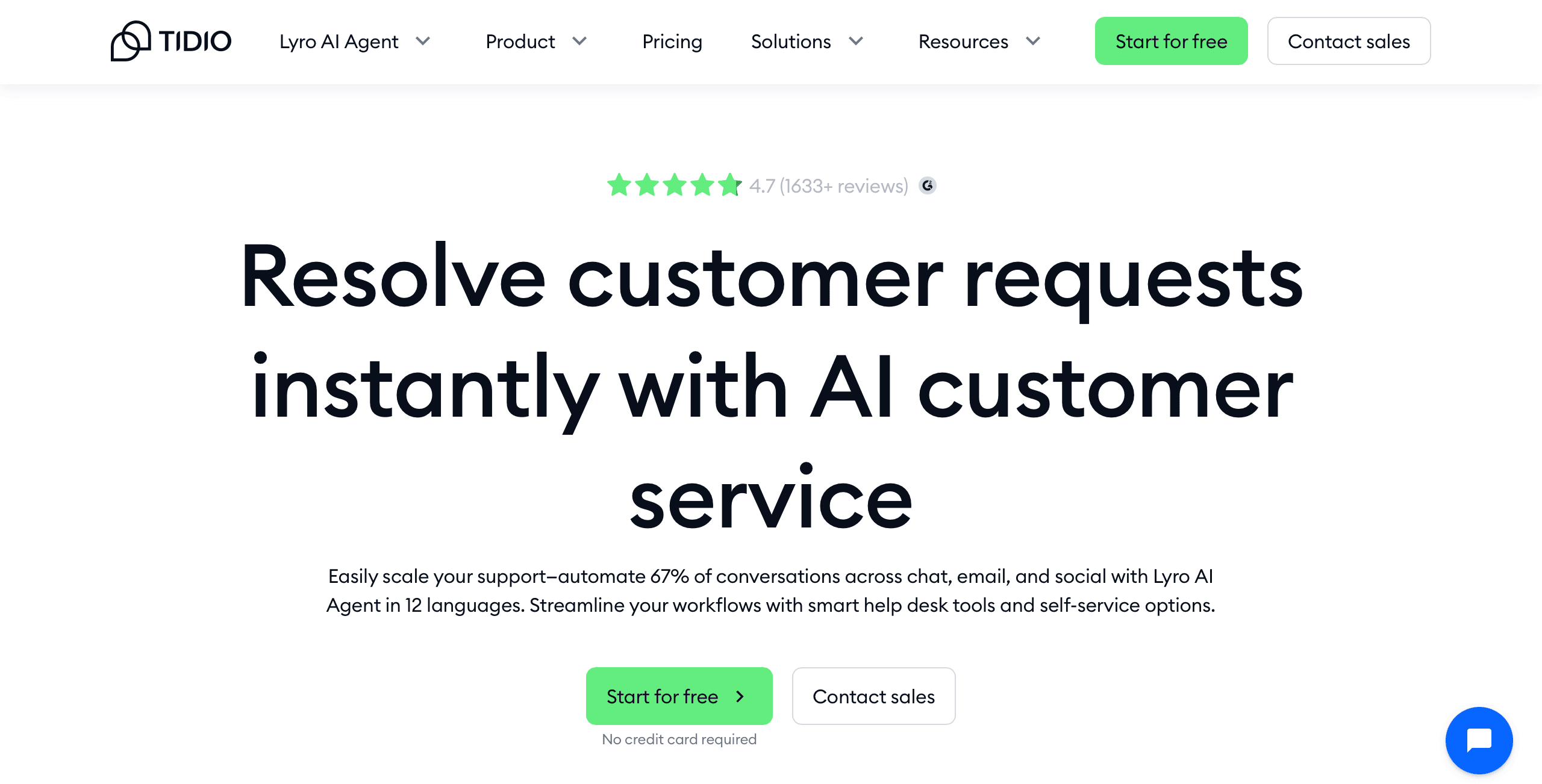
Overview: Tidio combines live chat and AI chatbot technology to help businesses deliver responsive, round-the-clock customer support. Designed for eCommerce stores looking to streamline customer communication.
Key Differentiators:
- Blends real-time support with automated workflows effectively
- Ready-to-use eCommerce chatbot templates for quick setup
- Suitable for small to mid-sized online stores
Limitations:
- AI capabilities are relatively basic and rules-based
- Limited depth in handling complex, multi-turn queries
Key Features:
- Direct integration with Shopify, WooCommerce, and Wix
- Drag-and-drop visual flow builder
- Centralized team inbox for managing multiple conversations
6. Ada
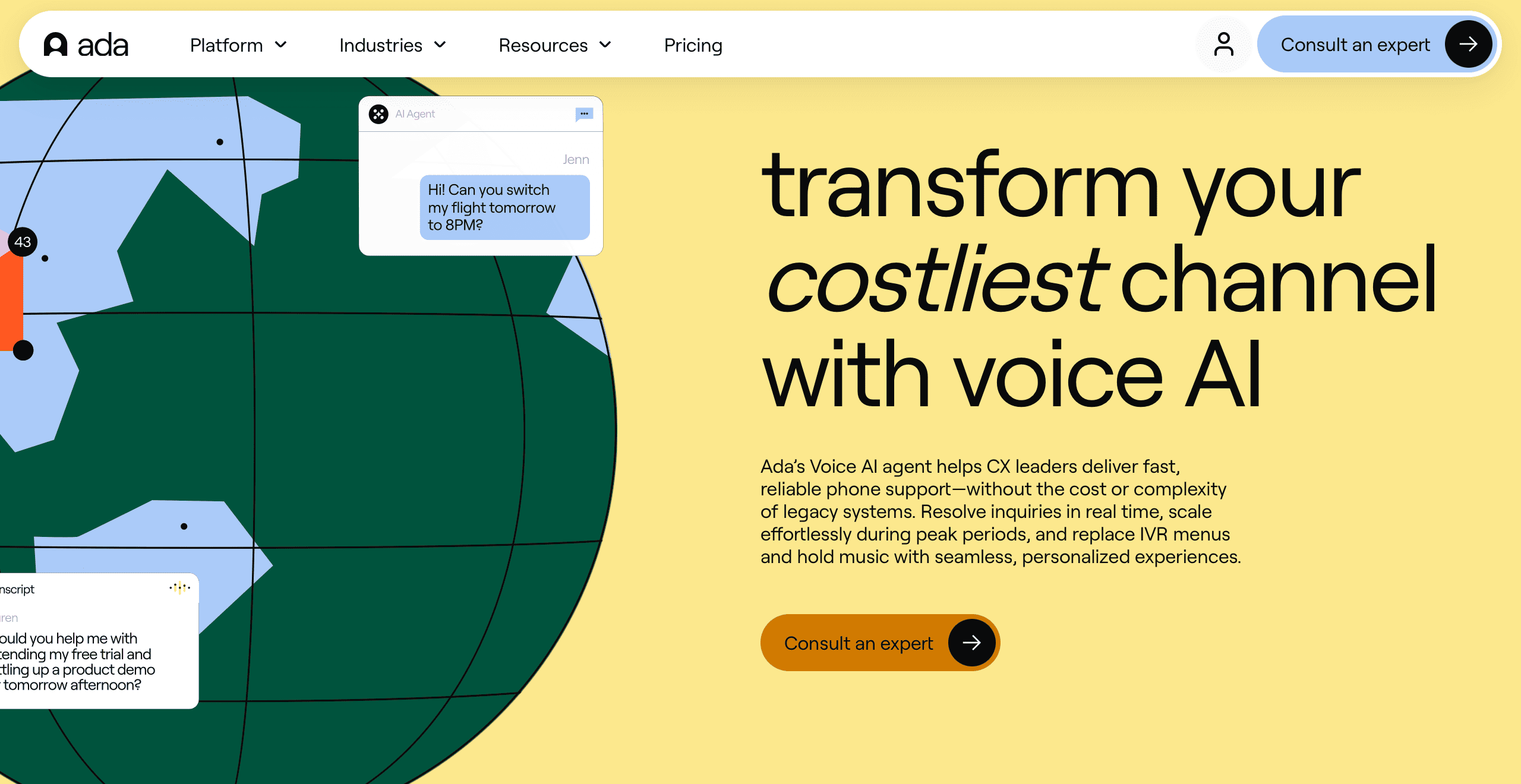
Overview: Ada is an AI-first platform tailored for automating customer service at scale. It uses NLP to help brands deflect support tickets and deliver consistent, on-brand automated experiences.
Key Differentiators:
- Highly effective in deflecting repetitive customer queries
- Supports training on brand tone, FAQs, and product data
- Proven to reduce customer support workload significantly
Limitations:
- Requires detailed initial setup and content mapping
- May require developer assistance for deep customizations
Key Features:
- AI-driven customer interactions with decision-tree logic
- Insights and analytics for bot performance and optimization
- Supports over 100 languages for global reach
7. Zowie
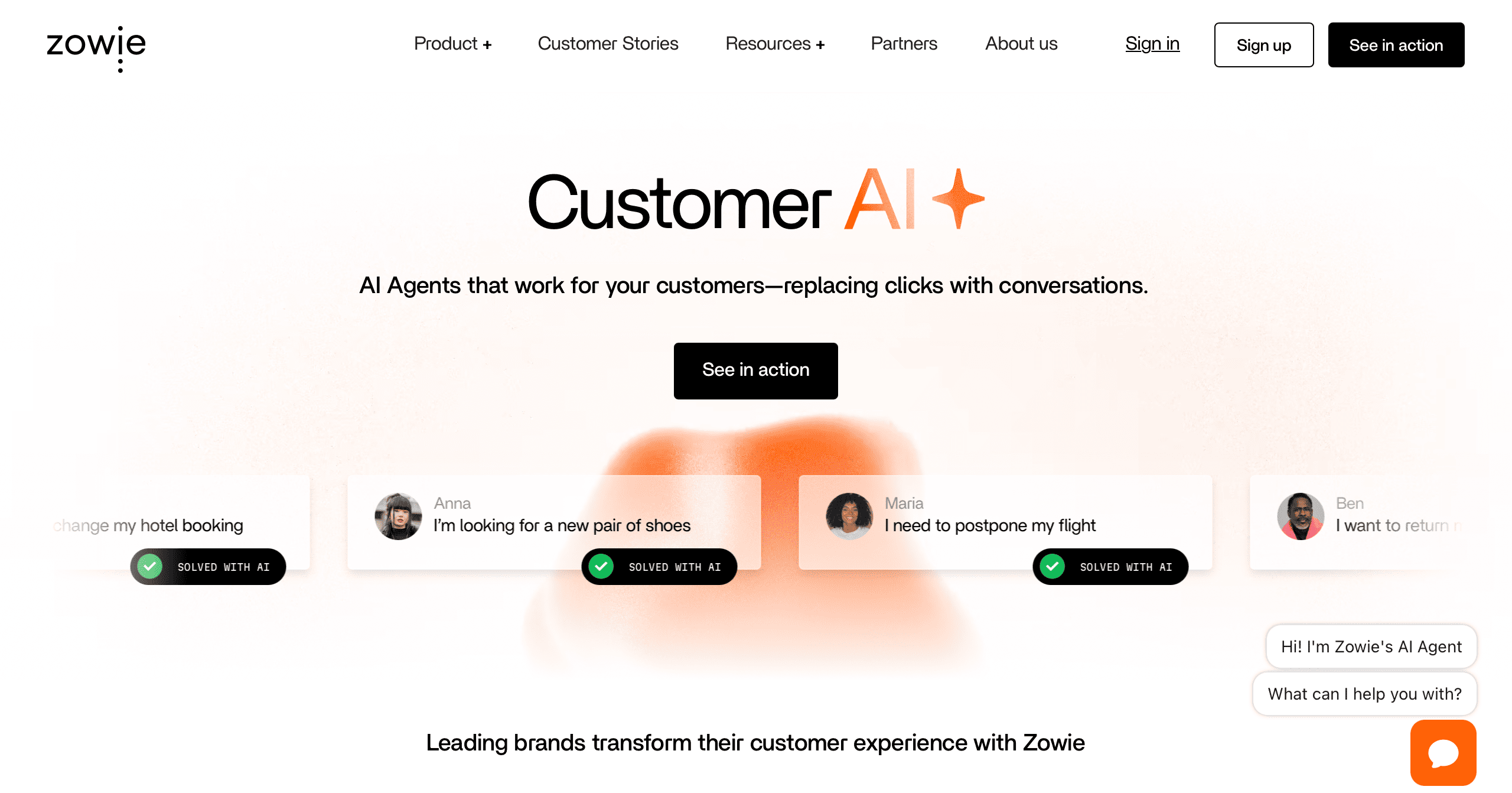
Overview: Zowie is a chatbot platform crafted specifically for eCommerce. It enables brands to automate responses to common product and order-related queries with minimal setup.
Key Differentiators:
- Pre-trained to handle retail-specific use cases from day one
- Rapid onboarding with ready-to-go product question templates
- Built for speed, with instant responses to FAQs and inventory inquiries
Limitations:
- Limited flexibility outside of predefined retail flows
- Doesn’t support voice assistants or broader conversational AI
Key Features:
- Plug-and-play integrations with Shopify, BigCommerce, and Salesforce
- Automated order status tracking and product recommendation bots
- Simple knowledge base syncing
8. Gorgias
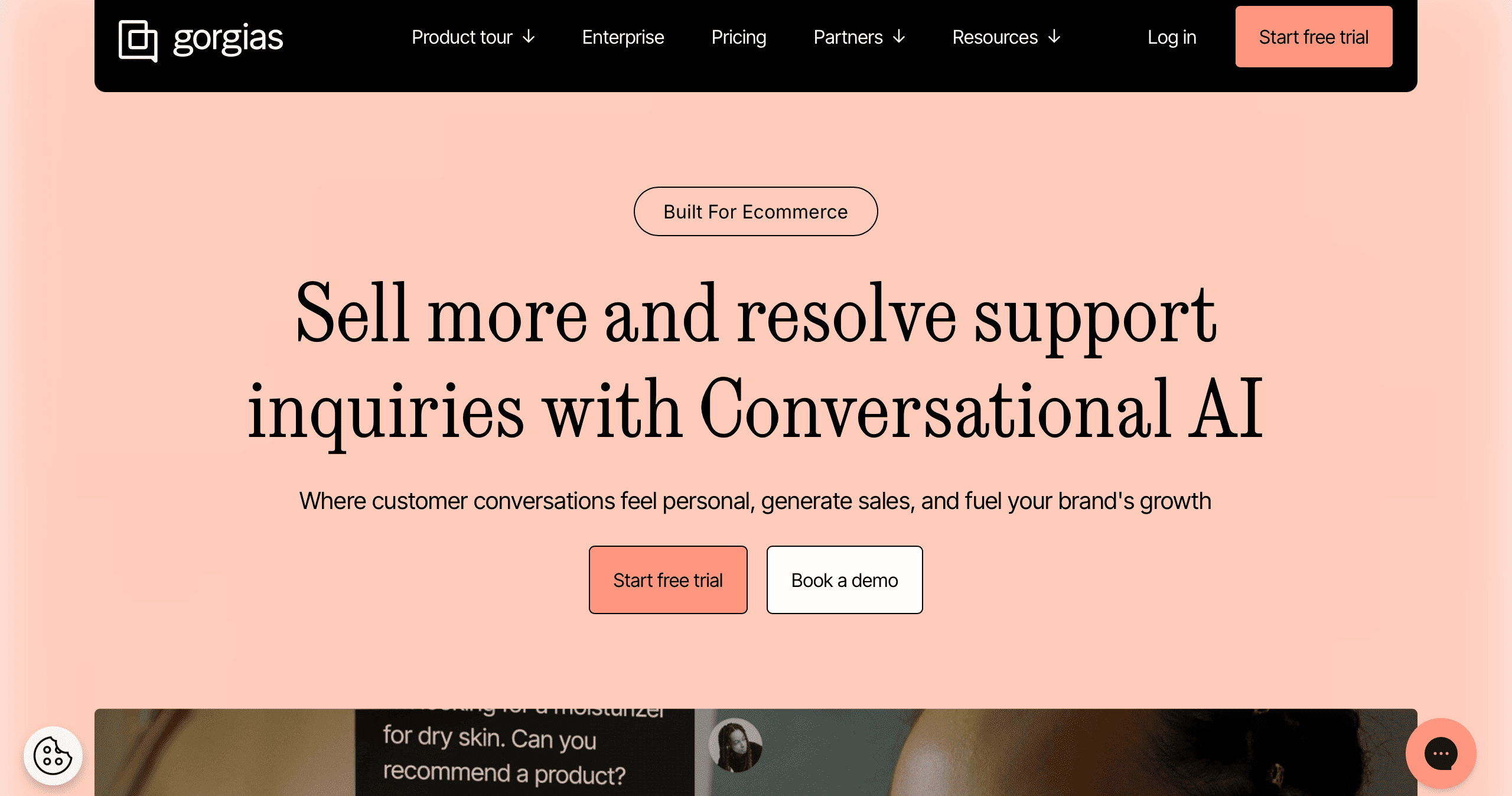
Overview: Gorgias is a helpdesk solution with built-in automation features, created specifically for eCommerce brands. It centralizes support across email, chat, and social platforms.
Key Differentiators:
- Rich automation for ticket categorization and replies
- Deep integration with eCommerce platforms like Shopify and Magento
- Reduces response time through AI-powered suggestions and macros
Limitations:
- More of a helpdesk tool than a full conversational AI platform
- Limited support for dynamic or freeform conversations
Key Features:
- Unified dashboard for multichannel support
- Auto-responses based on customer and order data
- Workflow automation using rules and macros
9. Octane AI
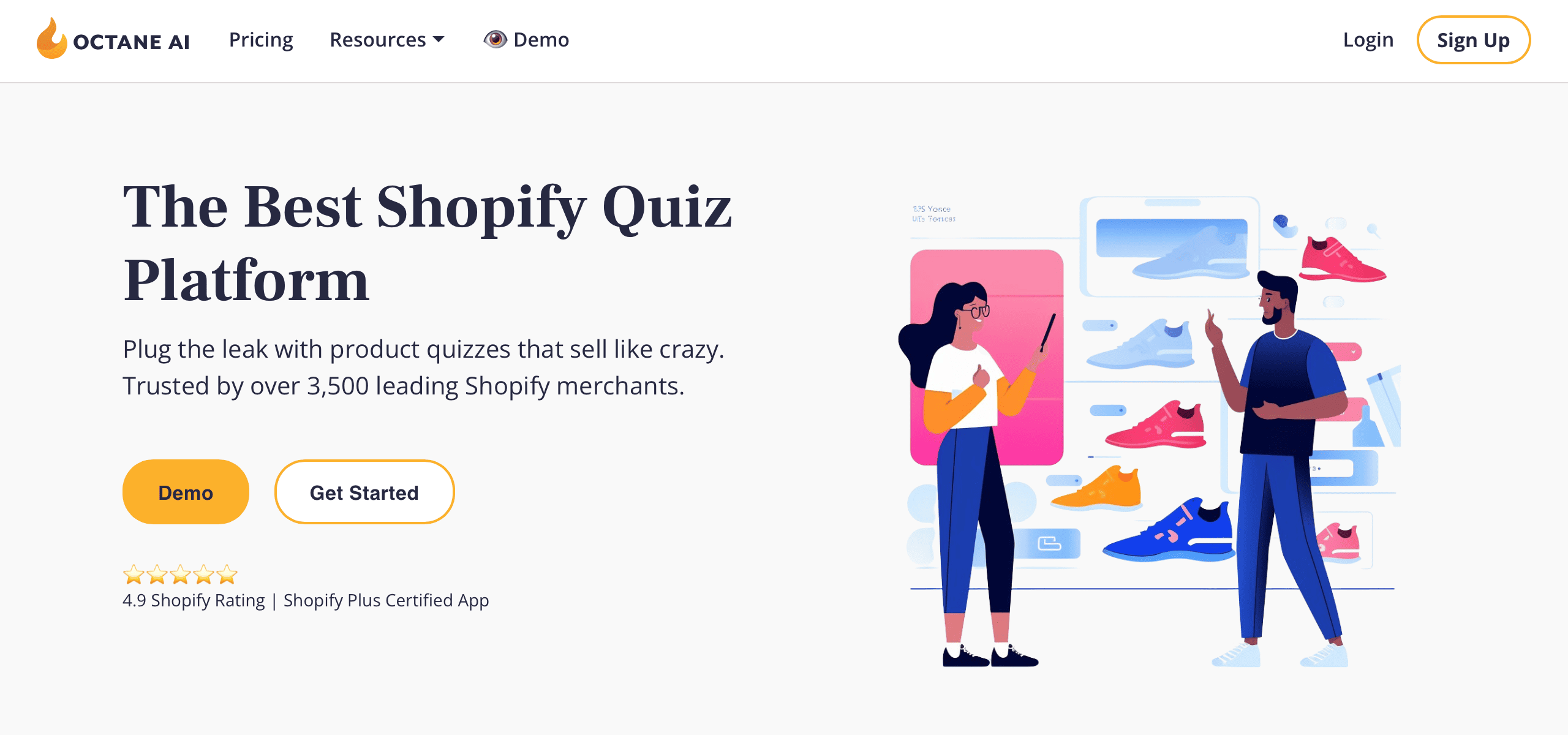
Overview: Octane AI is a conversational commerce platform that helps eCommerce brands increase sales through quizzes and personalized shopping experiences.
Key Differentiators:
- Engaging product quizzes that drive higher conversions
- Personalization engine that tailors product recommendations
- Focused on top-of-funnel discovery and data collection
Limitations:
- Limited features for post-sale or support workflows
- Best suited for product discovery, not customer service
Key Features:
- Interactive product recommendation quizzes
- Seamless integration with Klaviyo and Recharge
- Customer insights and segmentation tools
10. LivePerson
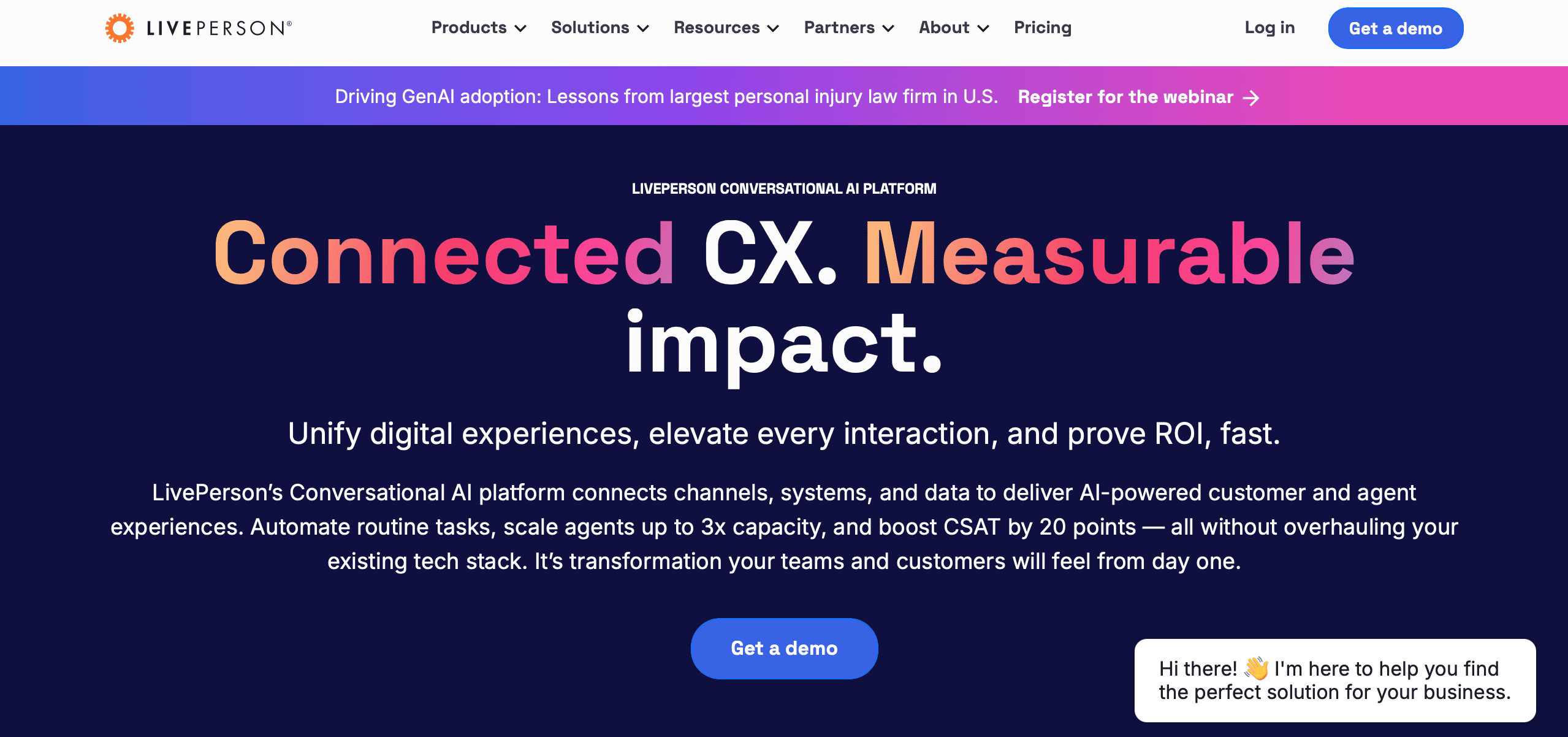
Overview: LivePerson is an enterprise-grade conversational AI platform designed for large-scale customer engagement across web, mobile, and messaging channels.
Key Differentiators:
- Supports conversations across multiple channels including WhatsApp, SMS, and web
- Sophisticated analytics and real-time intent recognition
- Designed for complex enterprise needs with high scalability
Limitations:
- Requires considerable setup and customization
- Higher total cost, making it more suitable for enterprise businesses
Key Features:
- AI-powered chat across channels with human fallback
- Intent-based routing and response customization
- Detailed conversation analytics and bot performance metrics
How to Choose the Right Conversational AI Tool?
The right conversational AI for eCommerce can transform customer engagement, boost sales, and reduce operational costs, but selecting the best solution requires careful consideration. With advancements in conversational AI in e-commerce, businesses must evaluate tools based on their ability to provide quick responses, enhance customer loyalty, and adapt to future trends.
Below, we break down the best practices for choosing a conversational AI chatbot for eCommerce that delivers at a deeper level of personalization and automation. To ensure you select the best conversational AI e-commerce solution, assess the following factors:
| Consideration | Why It Matters | When to Prioritize It | How to Evaluate |
| Integration Capabilities | Ensures seamless connectivity with your existing tech stack (Shopify, WooCommerce, CRM, ERP). | If you use multiple platforms (e.g., Shopify + Zendesk). | Check API documentation and pre-built connectors. Test with a sandbox environment. |
| Natural Language Understanding | Determines how well the AI interprets customer queries, including slang and typos. | If your customers ask complex or varied questions. | Run test conversations with real customer queries. Check if the AI handles follow-up questions well. |
| Personalization & Context Retention | Boosts customer loyalty by remembering preferences and past interactions. | If repeat purchases or upselling is key to your strategy. | Verify if the tool tracks user history and adapts recommendations. |
| Omnichannel Support | Allows AI to engage customers across WhatsApp, SMS, live chat, and voice. | If your customers use multiple communication channels. | Confirm which channels are supported (e.g., Messenger, Instagram, email). |
| Automation Depth | Reduces operational costs by handling FAQs, returns, and order tracking without human help. | If you receive high volumes of repetitive queries. | Test if the bot can execute multi-step workflows (e.g., processing returns). |
| Sentiment & Emotion Detection | Enhances interactions by adapting tone based on customer mood (frustrated, happy). | If customer satisfaction is a key metric for your brand. | Check if the artificial intelligence adjusts responses based on emotional cues. |
| Scalability | Ensures performance remains smooth during peak traffic (Black Friday, holidays). | If you experience seasonal spikes in customer inquiries. | Ask about server capacity and concurrent user limits. |
| Analytics & Insights | Helps refine strategies by tracking conversion rates, drop-off points, and popular queries. | If data-driven decision-making is crucial for growth. | Review dashboard features (e.g., conversation logs, intent analysis). |
| Pricing Model | Affects long-term ROI – some tools charge per interaction, while others offer flat-rate plans. | If budget constraints are a concern. | Compare pricing tiers and hidden costs (e.g., training fees). |
| Future-Proofing | Ensures the artificial intelligence can adapt to future trends like voice commerce and generative AI. | If you want a long-term solution, not just a quick fix. | Ask about roadmap features (e.g., ChatGPT integration, multilingual expansion). |
The Future of eCommerce is Conversational – Is Your Business Ready?
The integration of conversational AI for e-commerce, powered by advanced machine learning, is redefining retail’s future. These intelligent systems do more than respond to queries; they actively guide customers through personalized shopping journeys while generating actionable insights that drive business growth. The true competitive advantage lies in systems that can transform user experience through contextual and adaptive conversations; use machine learning to continuously improve interactions, and convert customer dialogues into strategic business intelligence.
FAQ
How does conversational AI for eCommerce integrate with our existing tech stack?
Modern conversational AI for eCommerce solutions offers pre-built plugins for Shopify, WooCommerce, and Magento. They also have API-based connections to major CRMs, Webhook support for custom ERP/OMS systems, and synchronization with product catalogs. Implementation typically requires minimal IT involvement. Usually, it’s just API key authorization and field mapping.
What’s the realistic implementation timeline?
For a conversational AI for eCommerce solution, you can expect to have everything up and ready in 2-3 days for a basic deployment (pre-trained retail artificial intelligence + standard integrations). If you’re going for full customization, you should consider 2-4 weeks of integration for brand voice tuning and complex workflow design. And for an enterprise-scale implementation, you can estimate the timeline to be 6-8 weeks (multi-language support, legacy system integration).
Can conversational AI for eCommerce recover abandoned carts?
Yes. High-performing conversational AI for eCommerce specializes in automated SMS/WhatsApp reminders with personalized incentives, abandonment reason identification through dialogue, and one-click recovery links embedded in chat. With this effort, conversational AI for eCommerce tools are able to increase average recovery rate up to 22-35% (compared to 10-15% for email-only recoveries).
![Top 10 Tools to Create Conversational AI for eCommerce [Banner] Top 10 Tools to Create Conversational AI for eCommerce [Banner]](https://cogniagent.ai/wp-content/uploads/2025/07/Top-10-Tools-to-Create-Conversational-AI-for-eCommerce-Banner.png)